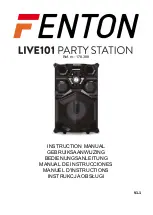
16
DELTA 4000
ZM-AH02E
3 TESTING POWER SYSTEM COMPONENTS
▪
Autotransformer: A transformer in which at least two
windings have a common section.
▪
Excitation Current (No-Load Current): The current which
flows in any winding used to excite the transformer when
all other windings are open-circuited.
▪
Tap (in a transformer): A connection brought out of a
winding at some point between its extremities, to permit
changing the voltage, or current, ratio.
▪
Delta Connection: So connected that the windings of a
three-phase transformer (or the windings for the same
rated voltage of single-phase transformers associated in
a three- phase bank) are connected in series to form a
closed circuit.
▪
Y (or Wye) Connection: So connected that one end of
each of the windings of a polyphase transformer (or of
each of the windings for the same rated voltage of single-
phase transformers associated in a polyphase bank) is
connected to a common point (the neutral point) and
other end to its appropriate line terminal.
▪
Zigzag Connection: A polyphase transformer with
Y-connected windings, each one of which is made up of
parts in which phase-displaced voltages are induced.
▪
Tertiary Winding: The third winding of the transformer
and often provides the substation service voltage, or in
the case of a wye-wye connected transformer, it prevents
severe distortion of the line-to-neutral voltages.
The following equipment and tests will be discussed in this
guide:
▪
Two-Winding Transformers
▪
Three-Winding Transformers
▪
Autotransformer
▪
Transformer Excitation Current Tests
▪
Shunt Reactors
▪
Potential Transformers
▪
Current Transformers
▪
Voltage Regulators
▪
Dry-Type Transformers
Two-winding transformers
Two-winding transformer measurement is described in
Figure 10.
3
T
esting power system
components
Transformers
Introduction
The transformer is probably one of the most useful electri-
cal devices ever invented. It can raise or lower the voltage
or current in an ac circuit, it can isolate circuits from each
other, and it can increase or decrease the apparent value
of a capacitor, an inductor, or a resistor. Furthermore, the
transformer enables us to transmit electrical energy over
great distances and to distribute it safely in factories and
homes. Transformers are extensively used in electric power
systems to transfer power by electromagnetic induction be-
tween circuits at the same frequency, usually with changed
values of voltage and current.
Dissipation/Power factor testing is an effective method to
detect and help isolate conditions such as moisture, carbon-
ization, and contamination in bushings, windings and liquid
insulation. In addition to power factor testing, transformer
excitation current measurements will help detect winding
and core problems.
The voltage rating of each winding under test must be con-
sidered and the test voltage selected accordingly. If neutral
bushings are involved, their voltage rating must be consid-
ered in selecting the test voltage. Measurements should be
made between each inter-winding combination (or set of
three-phase windings in a three-phase transformer) with all
other windings grounded to the tank (UST test). Measure
-
ments should also be made between each winding (or set of
three-phase windings) and ground with all other windings
guarded (GST test with guard).
In a two-winding transformer, a measurement should
also be made between each winding and ground with the
remaining winding grounded (GST-GND test). For a
three-winding transformer, a measurement should also be
made between each winding and ground with one remain-
ing winding guarded and the second remaining winding
grounded (GSTg test). This special test is used to isolate the
inter-windings. A final measurement should be made be
-
tween all windings connected together and the ground tank.
It is also desirable to test samples of the liquid insulation.
Definitions
▪
Step-Down Transformer: A transformer in which the
power transfer is from the higher voltage source circuit to
a lower voltage circuit.
▪
Step-Up transformer: A transformer in which the power
transfer is from the lower voltage source circuit to a
higher voltage circuit.
Summary of Contents for DELTA 4000
Page 2: ......
Page 5: ...ZM AH02E DELTA4000 5...
Page 9: ...ZM AH02E DELTA4000 9 1 Introduction...
Page 15: ...ZM AH02E DELTA4000 15 2 Interpretation of measurements...
Page 43: ...ZM AH02E DELTA4000 43...
Page 46: ...46 DELTA4000 ZM AH02E...
Page 47: ...ZM AH02E DELTA4000 47...
















































